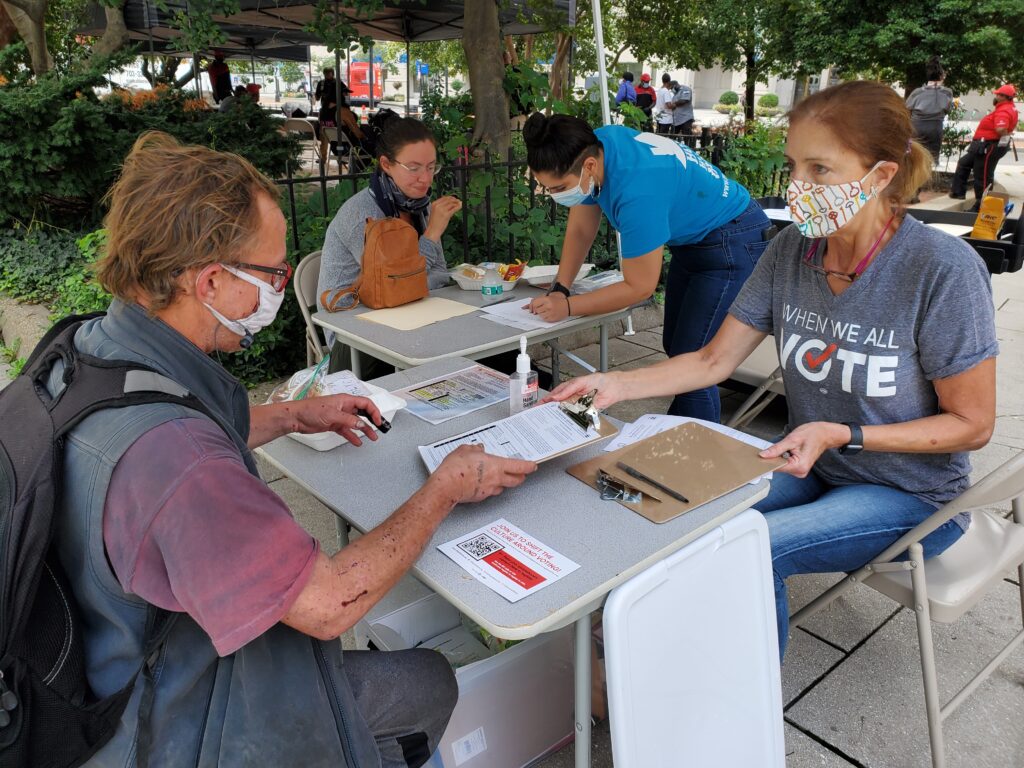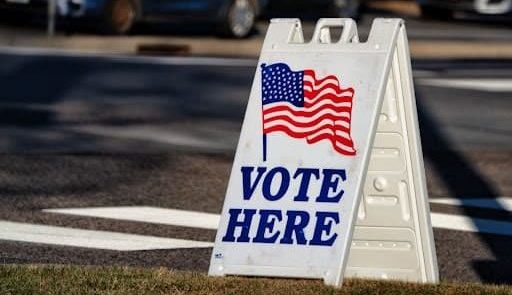Alexa Jade Southwick was picking up free lunch from the D.C. Downtown Day Services Center last Friday when she saw a voter registration tent right by the door. Southwick is experiencing homelessness and recently arrived in the District by bus from Texas.
The tent she discovered was run by Pathways to Housing D.C., an organization that helps connect people experiencing homelessness in the District with housing and other services. Brianna Perez, a bilingual outreach specialist with Pathways D.C., helped Southwick fill out a voter registration form.
Southwick was registered in Texas. With only three weeks until presidential election ballots are mailed, and without an address in D.C., she was worried that she wouldn’t be able to vote. But Perez reassured that she could use the D.C. Downtown Day Services Center address and pick up her ballot at their office.
[Read more: An emerging battleground: Housing in the 2020 presidential election]
“I think this [program] is revolutionary,” Southwick said. “Getting an address and registering to vote was another item on my list to getting settled, so this was extremely helpful — and also encouraging.”
D.C. law does not require new voters to demonstrate a minimum length of residency in order to register, only that they live in the District and do not “claim voting residence” anywhere else in the U.S. or its territories.

“[Not having an address] is a huge barrier,” Perez said. “It almost feels like folks are discounted from the process because they are experiencing homelessness.”
Maria Gusman, a benefits specialist at Pathways D.C., said the organization was already concerned with voter suppression in the upcoming presidential election. In the 2020 primary election in June, thousands of registrants did not receive mail-in ballots, the main medium through which the D.C. government intended citizens to vote during the COVID-19 pandemic.
The election also coincided with Black Lives Matter protests, for which Mayor Muriel Bowser implemented a 7 p.m. curfew, including on Election Day. Several in-person voters were even issued dispersal orders by police. The curfew exempted voters, although Metropolitan Police Chief Peter Newsham said officers would check credentials to see if people breaking curfew are truly there to vote.
But D.C. does not require documentation or voter identification to vote. This is essential for people experiencing homelessness who may not possess or may have lost their personal documents, or need their ballots to be delivered to a shelter or friend’s address—which may not be on their ID.
To combat such voter suppression, Gusman and other organizers at Pathways D.C. created the #PathwaystoVoting program to help people experiencing homelessness register for mail-in ballots on the spot. Volunteers like Perez have been setting up tents at the Downtown Day Services Center and the Pathways D.C. office in Ward 5 periodically since early September.
[Read more: Advocates warn most homeless people in DC will be left out of the 2020 primary election]
Volunteers help determine if individuals are qualified, consider options where they can have their ballots mailed, and clarify myths that may stop homeless individuals from voting.
One such myth is that those who have felony convictions or have been incarcerated are no longer able to vote in D.C. According to a recent report by the D.C. Fiscal Policy Institute, 57% of people experiencing homelessness in D.C. have been previously incarcerated, and 55% said incarceration caused their homelessness.
But in D.C., people with felony convictions can still vote, even while in prison. Gusman recalled being surprised to learn that.
“And we realized that if we didn’t know that, then a lot of the homeless won’t know that,” Gusman said. Perez recalled several people experiencing homelessness who only learned they could vote as felons when they approached the tent. She said one individual, upon learning, excitedly filled out the registration form.
“We make sure to let people know, ‘Hey, you know you did your time, you are out,’” Perez said. “We don’t need to keep punishing people who have already given so much of their lives.”
[Read more: New report grades 16 states with high rates of homelessness on how easy it is for their homeless residents to vote]
Gusman noted how important it is for volunteers to be there in-person to help people experiencing homelessness through the registration process. She has seen multiple individuals lose confidence while filling out the form when they reach question 13, the voter eligibility requirements. For example, some may see the requirement, “I live in the District of Columbia at the address above,” and believe that they cannot check that box.
But Section 7 of the National Voter Registration Act encourages nongovernmental entities to serve as voter registrations agencies, including homeless shelters and drop-in shelters like the D.C. Downtown Day Services Center. As such, people experiencing homelessness who wish to seek aid or already seek aid from the center can register to vote in D.C., and use the center address.

Someone previously incarcerated might misinterpretthe requirement, “I have not been found by a court to be legally incompetent to vote” as confirmation that they cannot vote.
Yet the question has nothing to do with felons. This is a controversial requirement where a court may deem a mentally disabled individual legally incompetent to vote. In some situations, a person experiencing homelessness who is also mentally disabled may not know if they are eligible. In this case, Pathways D.C. volunteers help determine their eligibility.
“One of the hardest things I’ve seen is someone … who filled everything out, got to that part, and said, ‘Sorry, I can’t do it,’ and walked away,” said Gusman. “There is the chance that … we might have been able to confirm that he is eligible, but at the same time, there is a lot of stigma around the homeless that prevent people from being able to register. And they don’t necessarily want to talk about it.”
Despite the barriers in the way, Gusman and other Pathways D.C. volunteers hope that by doing in-person outreach like this and clarifying myths, they can empower people experiencing homelessness to exercise their right to vote.
“It’s about re-enfranchising voters,” Perez said, “and giving them the opportunity to participate in something that everyone has the right to participate in.”





